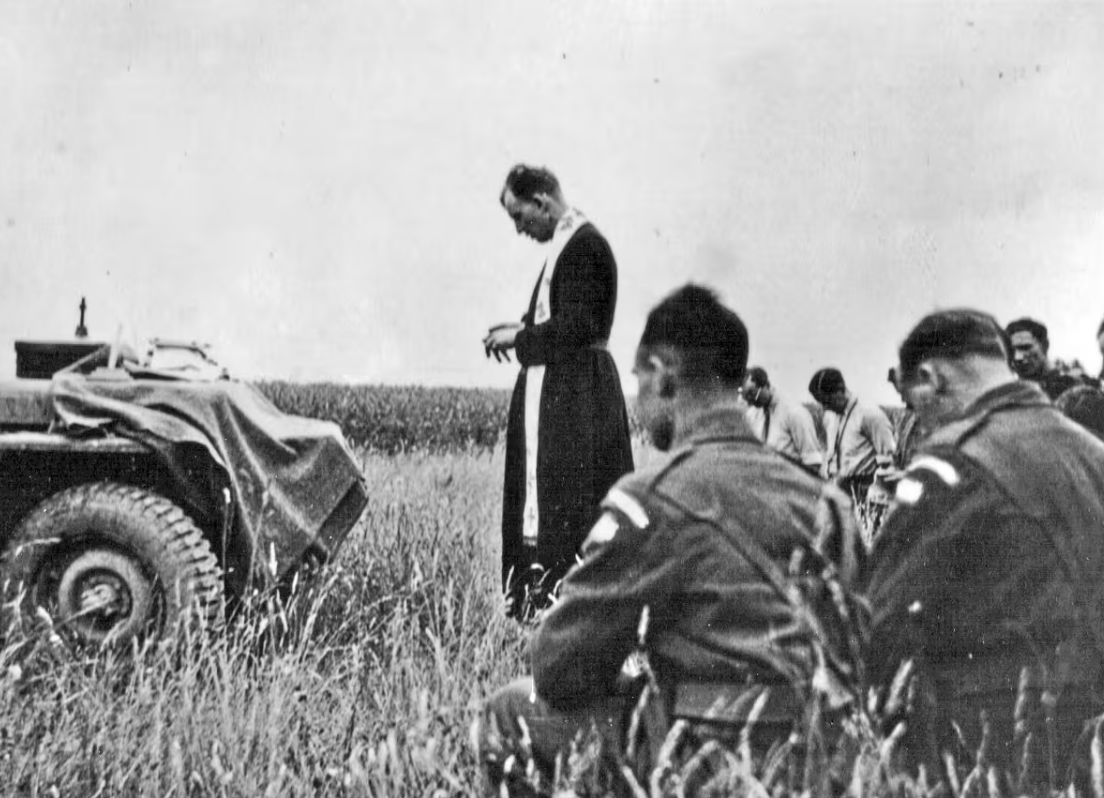In an order distributed to the expeditionary force, Gen. Dwight D. Eisenhowerhailed the cross-channel invasion as a “Great Crusade” and invoked “the blessing of Almighty God upon this great and noble undertaking.” That language might grate against 21st-century sensibilities. In the intervening decades, a tide of secularization, the growth of multifaith societies, and the bitter legacy of subsequent conflicts have infused such sentiments with a toxicity they didn’t possess in 1944. In many Catholic and mainline Protestant churches, now in thrall to a functional pacifism born of the nuclear age, such militancy seems alien and unsettling, something best forgotten.
Yet World War II, and D-Day in particular, wasn’t the “notably secular affair” historian Paul Fussell once claimed it to be. Operation Overlord was carried out primarily by countries in which Judeo-Christian beliefs and values were normative and unifying. Despite popular misconceptions, the shock of World War I hadn’t made the Lord of Hosts redundant. A generation after the Great War, faced with an apparently existential threat, the Western and historically Christian democracies still sought comfort, definition and inspiration in a faith that set them apart from the neopaganism of Nazi Germany.
This identity was evident in the wartime broadcasts of King George VI (“Defender of the Faith and Supreme Governor of the Church of England”), in the rhetoric of Winston Churchill, who rallied the British people to the defense of “Christian civilization,” and in Franklin D. Roosevelt’s insistence that freedom of worship was one of America’s ultimate war aims. Notwithstanding the dislocation and moral panics of the war years, the U.S. and Britain witnessed a striking cultural revival of Christianity.
Both nations saw a surge in religious broadcasting—think of C.S. Lewis’s lectures on the BBC that became the book “Mere Christianity.” Hollywood films such as “Mrs. Miniver” (1942) and “The Song of Bernadette” (1943) celebrated the virtues of simple Christian faith, the former helping to steel the U.S. for war. As news of the D-Day invasion spread, houses of worship filled for services, perhaps the “greatest wave of mass intercession in history,” as one magazine described it.
These characteristics were also reflected in the Allied forces, served in wartime by as many as 18,000 uniformed chaplains. Solemn services and confessions preceded D-Day, and specially built mobile churches accompanied the troops after the invasion. The majority of soldiers who landed wore identification tags bearing their religious affiliation, which determined how they would be cared for if wounded or killed.
Faith mattered to military morale. In armies that lacked deterrents against desertion and weren’t driven by a totalitarian ideology, shared religious values and sentiments were an important motivator. For Gen. Bernard Montgomery, a bishop’s son, “the Lord mighty in battle” featured as a recurrent trope in his pre-battle messages to soldiers. Likewise, his colorful and outspoken rival, Gen. George S. Patton, told his GIs that they weren’t only materially better off than their German foes, but “in the place of his blood-glutted Woten”—Odin, a German pagan God—“we have with us the God of Our Fathers Known of Old.”
Such strident appeals could have purchase only in societies that believe in God. An estimated 95% of U.S. soldiers and 99% of British self-identified as Christian or Jewish. A symptom of this was an almost universal turn to prayer in the face of danger among fighting troops. While the dictum that “there are no atheists in foxholes” was hyperbole, extensive wartime surveys of American infantrymen showed that prayer was the most important source of personal support “when the going was tough.”
The same wasn’t true of Hitler’s Wehrmacht. Officially, the Luftwaffe and German units of the SS had no chaplains. While Gott mit uns—“God with us”—was inscribed on German Army belt buckles, German soldiers captured on D-Day were surprised by a visit from a German-speaking British chaplain concerned for their religious welfare. According to Marten Eineg, who was among the captured, this approach was received with derision. Similarly, senior German Army chaplains were surprised to learn that whereas their own divisions might have two chaplains (Catholic and Protestant), many Allied divisions had at least 15.
For our own generation, D-Day may seem to have scant connection with religion, beyond its lingering association with some terminology embarrassing to modern ears. Yet to many contemporaries, it marked a decisive moment in a life-or-death struggle between the Judeo-Christian democracies of the West and the malignant pagan forces of Nazi Germany. The success of D-Day, like that of the Dunkirk evacuation four years earlier, was naturally and widely taken as providential.
To see this article in its entirety and to subscribe to others like it, please choose to read more.
 Listen Online
Listen Online Watch Online
Watch Online Find a Station in Your Area
Find a Station in Your Area










 Listen Now
Listen Now Watch Online
Watch Online
